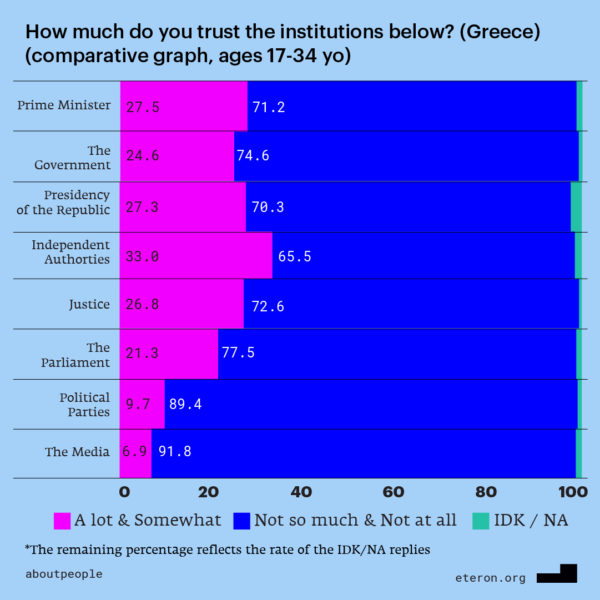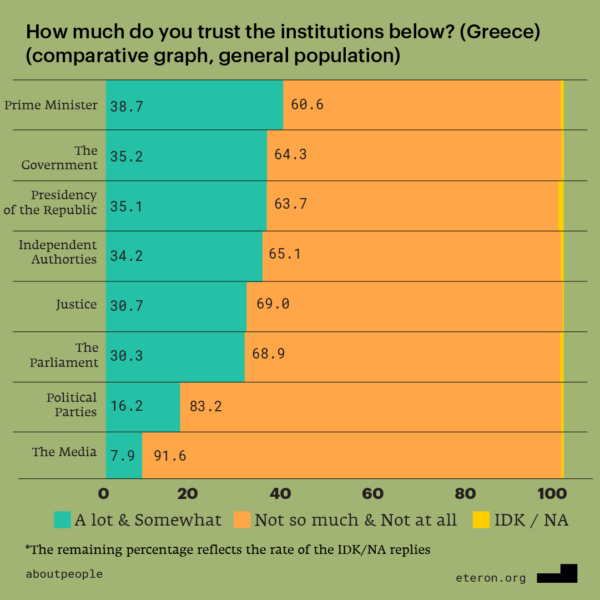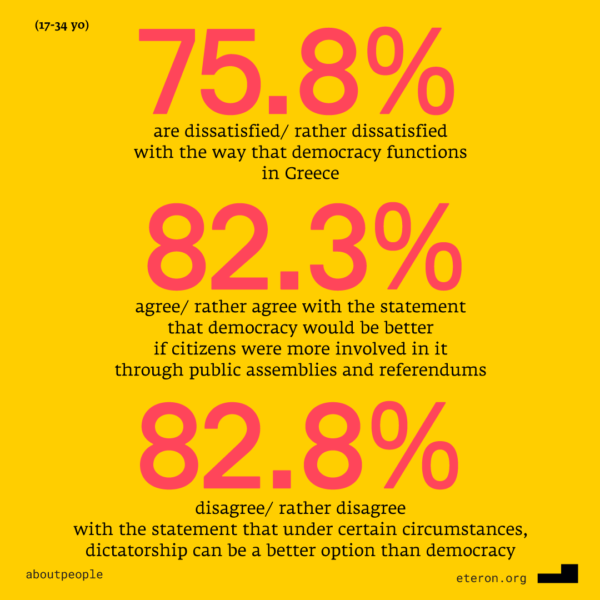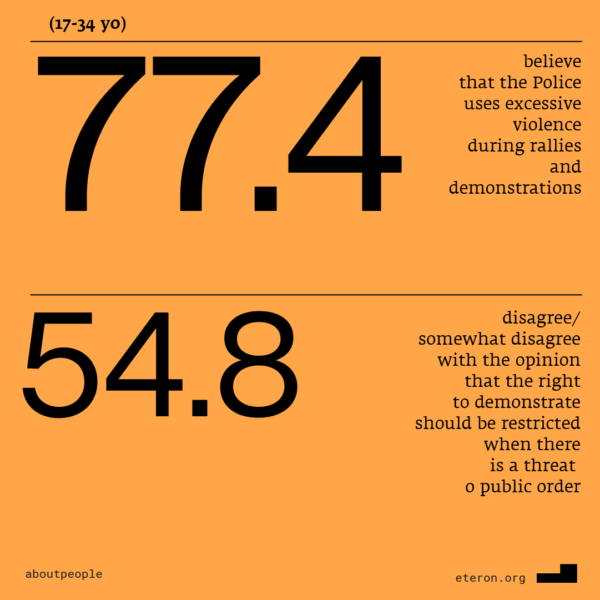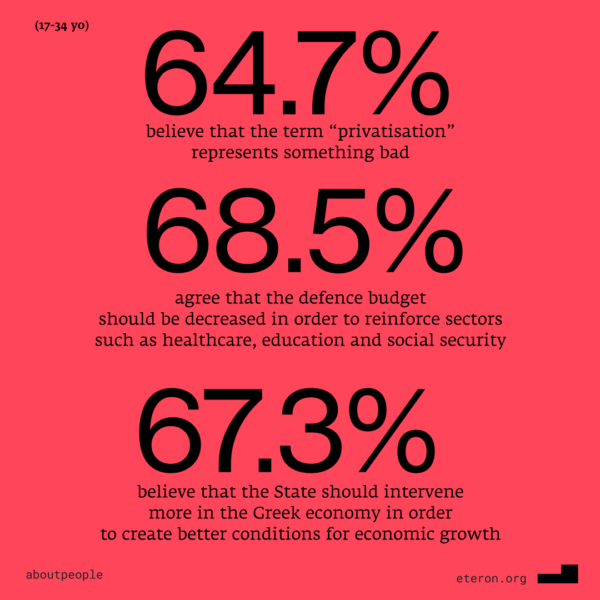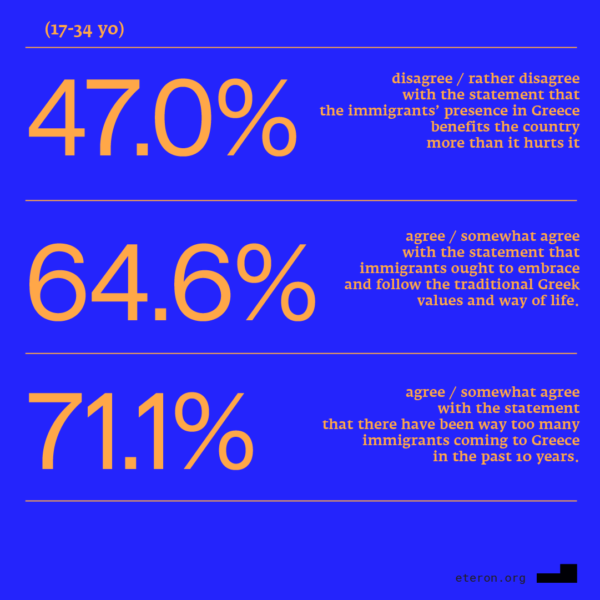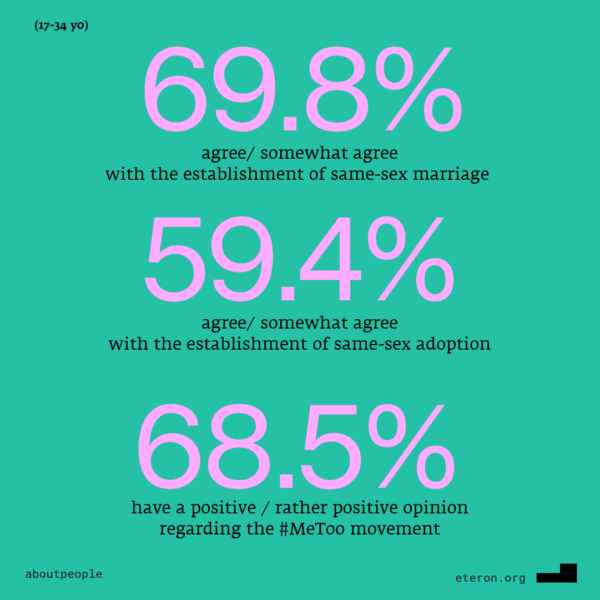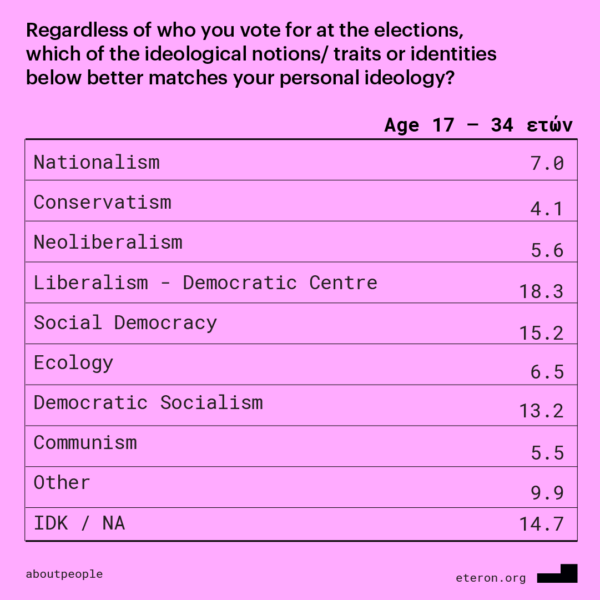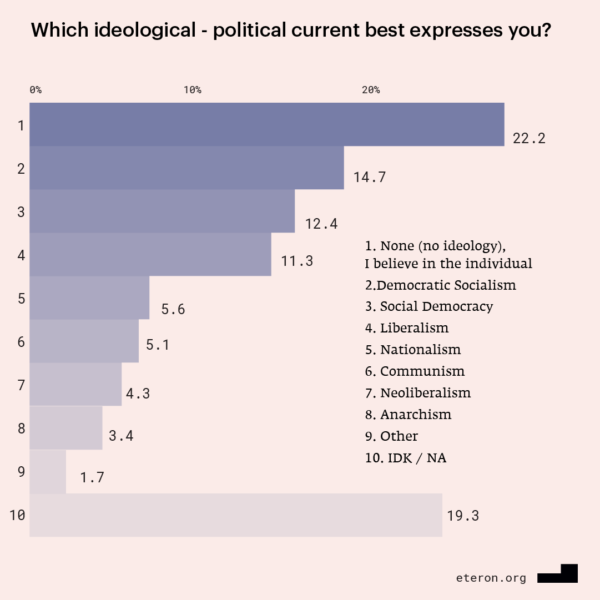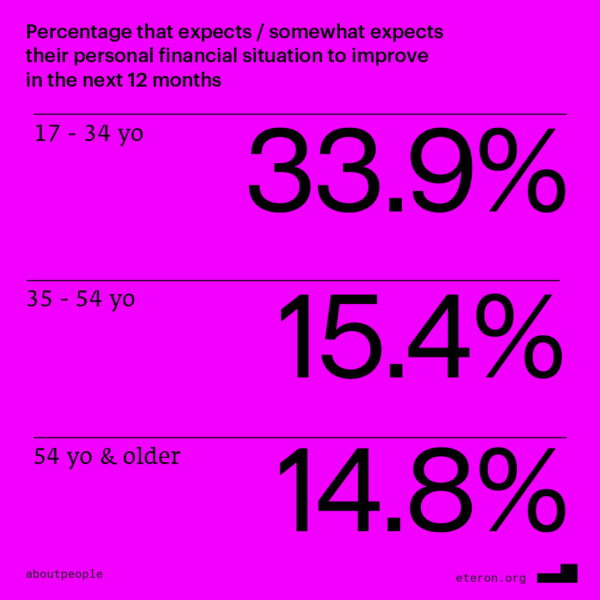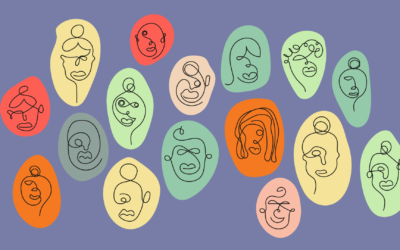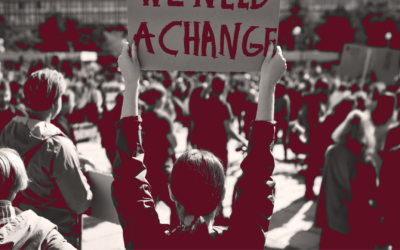
Mapping the young generation: A comparative analysis
Research Identity
In early April 2023, Eteron Institute released the large-scale research “An Insight into the Minds of Voters: Ideologies, core values, stances” in collaboration with aboutpeople. Said research is part of the project “Society: In-depth”, coordinated by Yannis Albanis. The research was conducted by Gerasimos Moschonas, Professor of Comparative Politics at Panteion University, and Petros Ioannidis, Managing Director of aboutpeople. The survey took place between 17 and 27 March 2023 via online and telephone interviews of a sample of 4,182 people over 17 years old from all over Greece. Due to the large sample size of the research, it was possible to analyse the responses according to the participants’ party preference. This was the research’s strong point, as it allowed us to better understand political parties through an analysis of each party’s electorate.
The sample of 4,128 participants includes responses from 721 young people aged 17-34.
Today, we will bring to the fore the results of the above quantitative research using data sorted by age group, focusing on the findings regarding the young generation’s positions.
The survey takes an in-depth look at views on politics, institutions, democracy and the major ideological and value issues that have long been the subject of public debate.
The entire research along with its accompanying tables and graphs and including an analysis according to age group is available in pdf format in Greek.
The main objectives of the following analysis are:
- to outline the young generation’s political profile by focusing on the following topics: institutions, democracy & collective action, economy, spending & the role of the State, immigration, LGBTQI+ rights & MeToo, ideological references & expectations for the future.
- to identify and comment on the most pronounced differences that emerge in some responses by analysing the results by age group.
- to enrich our perspective through a comparative analysis of the findings of this research with those of the “The Young Generation after the Tempi Train Disaster” research, as well as those of the researches and analyses conducted by Eteron last year, on the post-pandemic economy and Generation Z.
Methodological remarks:
“Is there such a thing as the ‘Tempi generation’? One should be cautious. After all, we know that a generation is not merely an age convention; it carries value especially when referring to universal experiences, to broader conditions in which a common ground, an ‘identity’ is formed – even if it is never an identity that’s set in stone. In our case, however, it may be something more than a ‘journalistic’ description. And this is because the Tempi train accident is precisely such a universal event.”
Giannis Balabanidis in an article published in Kathimerini newspaper, 5/4/2023
Before moving on to comments on the main topics we shall address, we need to make some brief methodological remarks, as the careless use of the term “generation” can blur rather than clear the path of social research. In a relevant study on the concept of “generation”, published in the autumn of 2019 by Crete University Press, Evgenios Matthiopoulos mentions frivolous uses and/or misuses of the term, attempting a critical overview of generational theories.
As he points out, the fundamental error can be traced in the “passage from the empirical perception of the meaning of a common word, to its use as an abstract concept, without, however, sufficiently clarifying its semantic depth and breadth within the context of a scientifically structured interpretive reasoning” (p. 31).
The use of the concept of “generation” was a major focus point for us during the past year, in the context of the “Gen Z – Voice On” project, with the all relevant analyses included in Eteron’s e-book entitled: “Gen Z, Politics & Social Media during the Pandemic: Research Findings and Commentary”. As sociology professor and former president of the American Sociological Association, Ruth Milkman, points out in the interview she gave Eteron, it is wrong to distinguish between generations based on demographic traits or consumer tastes.
Drawing on the work of Karl Mannheim, she points out that “a generation is not a biological phenomenon defined by age but a sociological one defined by the dramas of history.” In this sense, Milkman helps to approach the concept of “political generation”. In this approach, it is not the year in which one is born that is most significant, but rather the historically specific, shared experiences that crucially shape the ways of thinking that differentiate one generation from another.
In this context, we will outline the political profile of the younger generation and identify some clear generational differences in the participants’ responses according to their age group. We decided to treat young people between the ages of 17 and 34 (Generation Z and young Millennials) as a single age group. Our choice is based on a widely accepted position in the international literature: that Millennials and Gen Zers were shaped by so many shared experiences that one could argue that they constitute one generation. On the other hand, we ought to acknowledge the limitations of this choice.
As Malouta and Zirganou correctly note in their article entitled “The young Greek voters of the Left and radicalism during 2010s”, apart from parameters such as class, ideology, gender, place of residence, etc, the time when young subjects experienced the 2008 crisis is “an additional parameter that differentiates perceptions” and “differentiates those who experienced it as a breakthrough (the older ones) from those who have not experienced anything different and therefore perceived it as ‘normality’”.
In other words, if we focus on a sample of young people aged 17-34, we only need to keep in mind that when the country entered the Memorandum years in spring of 2010, the upper limit of our sample was 21 years old, while the lower was just 4 years old.
At the same time, we shall examine the findings in a comparative context, bringing to the discussion, as already mentioned, previous Eteron research and especially the research recently published by Eteron “The Young Generation after the Tempi Train Disaster”, under the scientific supervision of PhD in Political Sociology and postdoctoral researcher at Panteion, Loukia Kotronaki. The data was collected by aboutpeople in mid-April 2023 on a nationwide sample of 634 young people between 17 and 34 years old.
A comparative study allows us to combine two questionnaires with different emphases, but which complement one another and enrich our perspective:
- The questionnaire of the “An Insight into the Minds of Voters: Ideologies, core values, stances” research, which does not focus on current affairs but rather emphasises on views regarding politics, institutions, democracy and major ideological and value issues &
- The questionnaire of the survey “The Young Generation after the Tempi Train Disaster” that puts more emphasis on the particular context after the fatal train accident in Tempi, highlighting the views, feelings and choices/ patterns of participation of young people in the relevant mobilisations.
In other words, the comparative analysis allows us to place young people’s overall views in a wider context and shed light on the circumstances under which they were formed.
Institutions, democracy & collective actions
The first topic we will address concerns young people’s stance towards the institutions and democracy, as well as their participation in collective actions.
The findings clearly show that after the Tempi accident, the young people’s crisis of confidence in institutions is deepening (Graph 1). All the key institutions that make up the Greek political system score very low in terms of the trust that young people have in them, with the media (91.8%), the political parties (89.4%), the Parliament (77.5%) and the Government (74.6%) occupying the top 4 positions. If we compare that with Graph 2, which gathers the results’ average for all age groups, we could argue that the crisis of confidence is generalised and is also recorded at the level of the general population (everyone aged aged 17 and over).
However, it is obvious that the levels of distrust towards the institutions are much higher amongst the younger generation. For instance, while the only institution that gathers more than 30% of young people’s trust are the Independent Authorities (33%), if we look at all the age groups cumulatively, all the institutions, with the exception of political parties and the media, gather trust rates ranging between 30-40% (cumulative percentages of “I trust them a lot/ somewhat”).
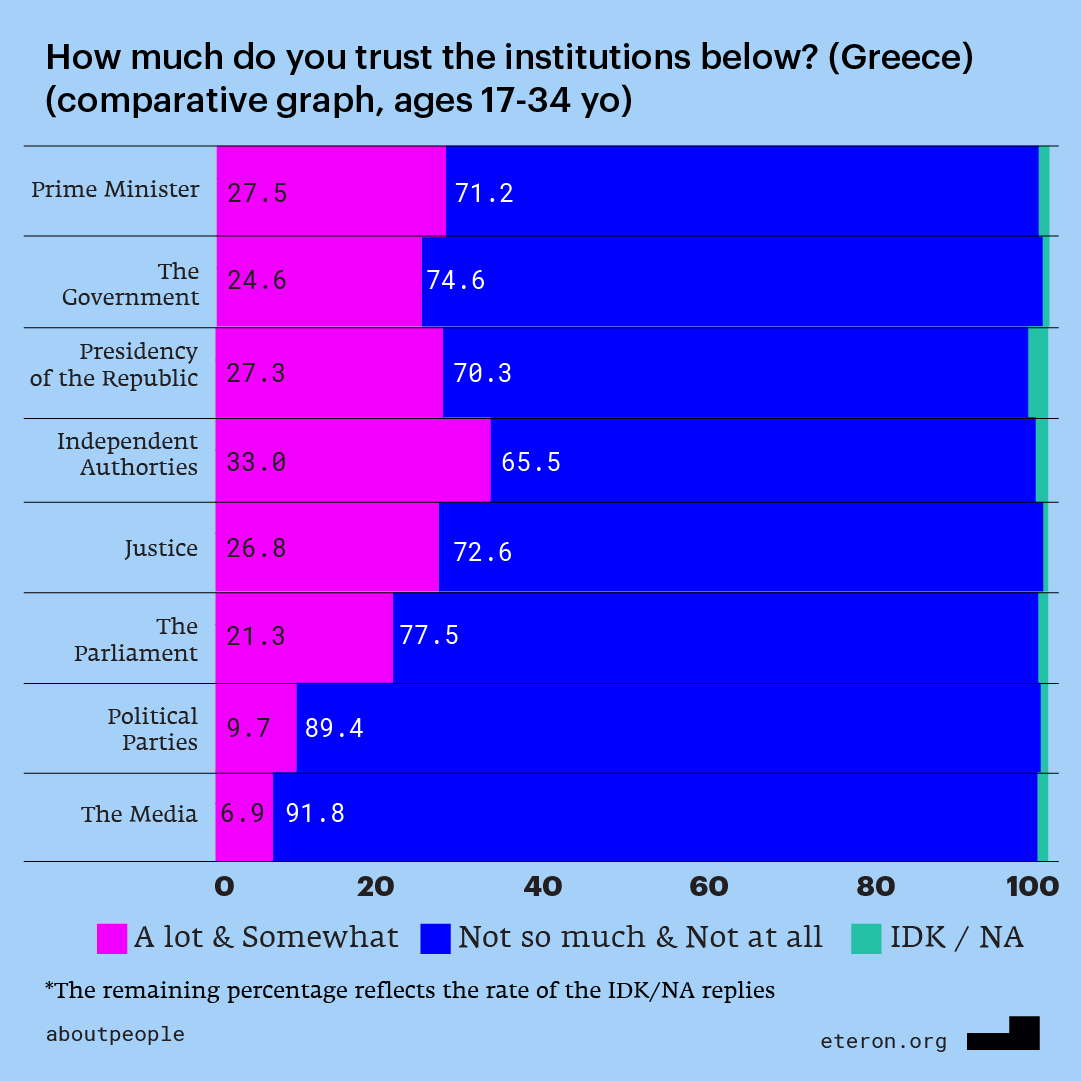
Graph 1
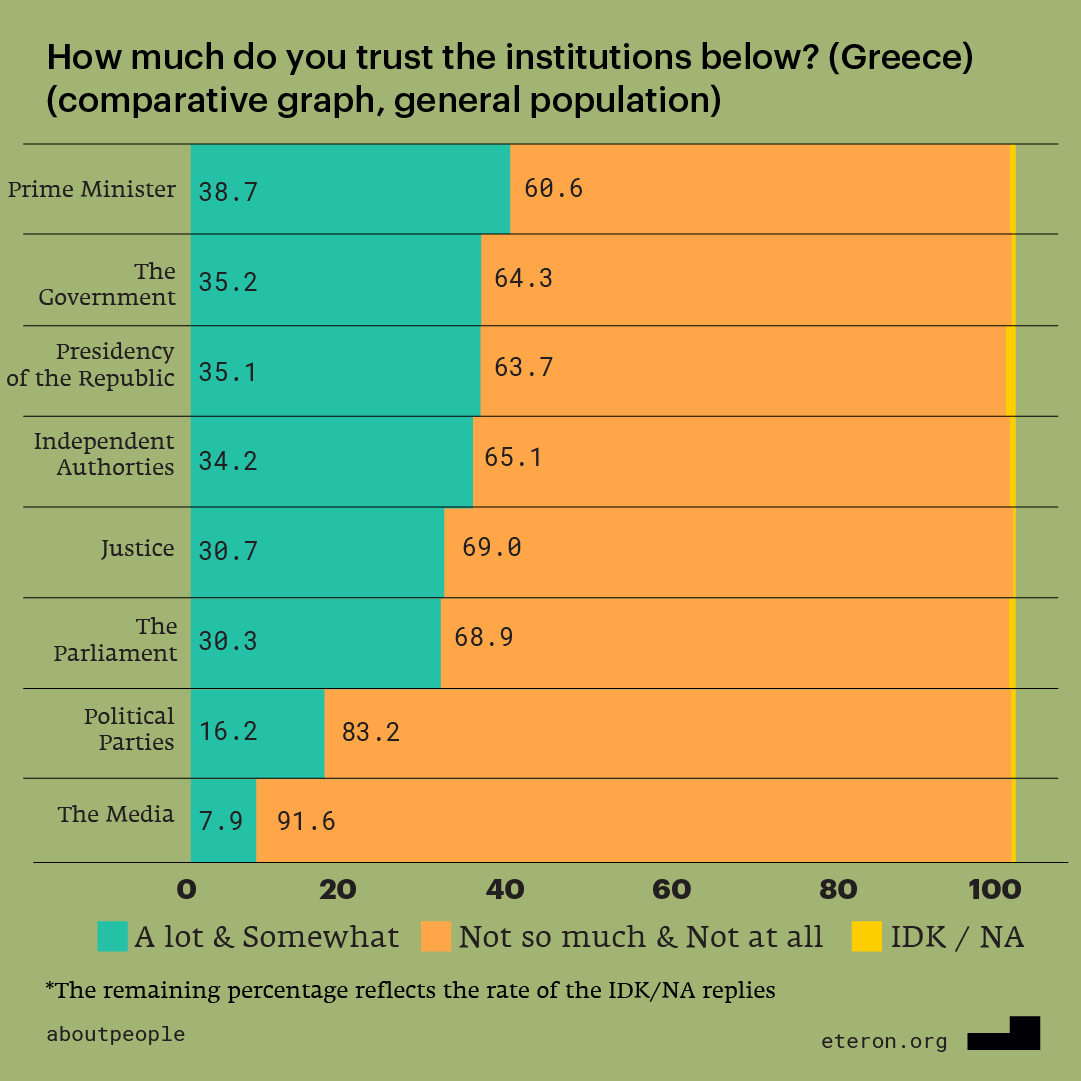
Graph 2
The findings of the research “The Young Generation after the Tempi Train Disaster”, are along the same lines, with the government – as an institution – and political parties in general, garnering the highest levels of distrust (75.4% and 88.5% respectively). More specifically when it comes to the media, it appears that young people have turned their backs both on television (distrust rates reaching 86.7%) and newspapers (72.2%).
These findings can also be interpreted in relation to the dominant emotions experienced by young people, such as rage (43.7%), despair (19.7%) and shame (17.4%), which constitute the emotional background of the extended distrust towards all institutions.
In that same context, the vast majority are dissatisfied or rather dissatisfied with the way democracy works in Greece (75.8%), although they state that despite its issues there is no better regime than parliamentary democracy (76.6%). 82.8% of young people disagree or rather disagree with the statement that, under certain circumstances, dictatorship can be a better option than democracy, while 14.6% agree or rather agree with this statement.
This anti-democratic nucleus of 14.6% is detected in many recent surveys and sets off alarm bells regarding the influence of the far-right on the new generation. Similarly, in Eteron’s research on Generation Z conducted last year, while a majoritarian democratic and anti-fascist reflex is clearly identified in the young generation, there is still evidence of an existing minoritarian far-right zone of influence.
Coming back to Graph 3, it is noteworthy that 82.3% believe that democracy would be better if citizens were more involved in it through public assemblies and referendums. Therefore, young people’s dissatisfaction with the way democracy functions in Greece is basically linked to a trend towards a deepening of the democratic imaginary.
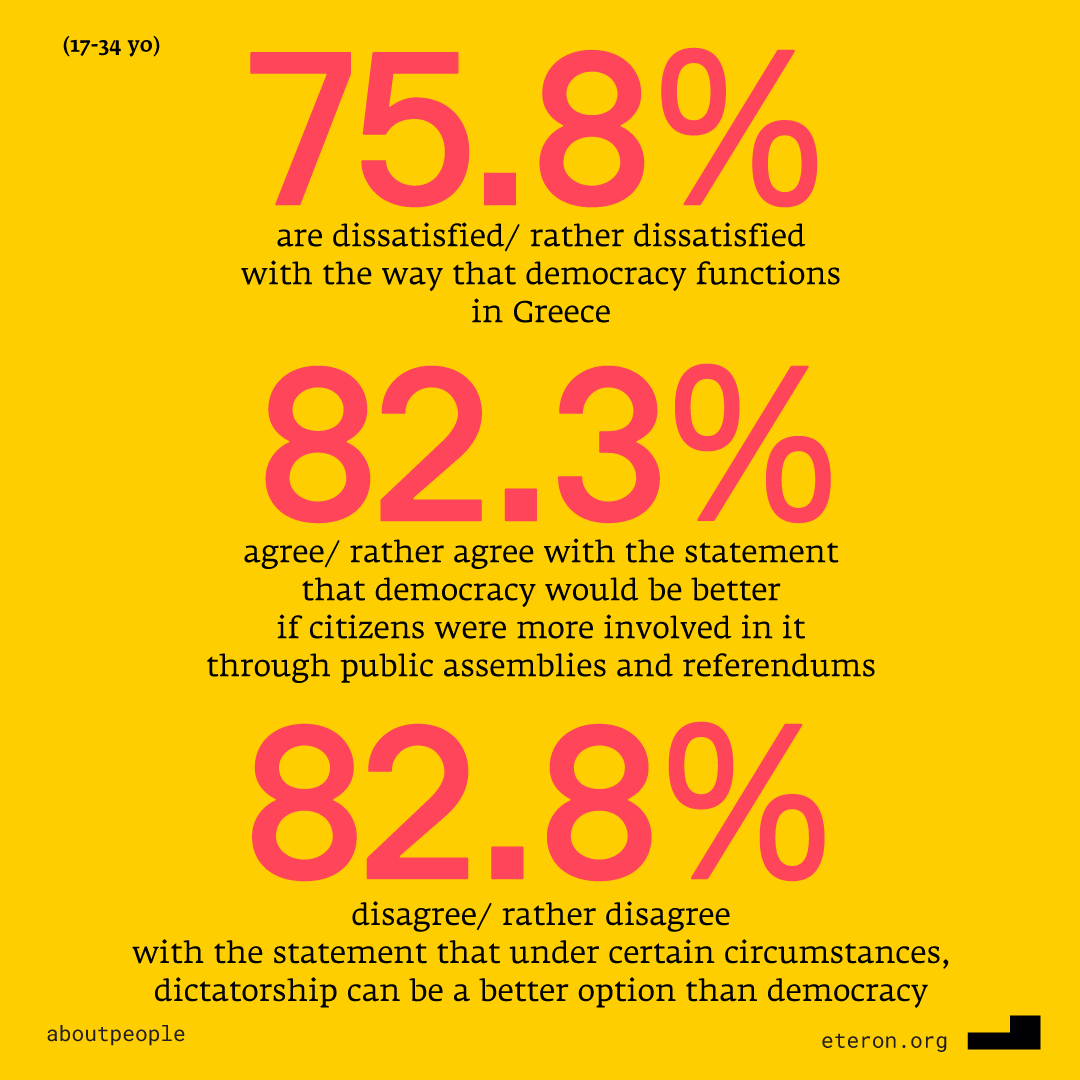
Graph 3
When comparing the responses of 17-34 year olds with the average of the relevant figures for all age groups, it is worth pointing out that there are indeed some – though not that big – generational disparities.
More specifically, across all age groups, 69.7% express dissatisfaction with the way democracy functions in Greece, 83% say that despite its issues, there is no better regime than parliamentary democracy, 13% agree or somewhat agree that in some cases dictatorship is preferable to democracy and, lastly, 78.6% believe that democracy would be better if citizens were more involved through public assemblies and referendums.
Back to the younger generation, a high percentage state that they are very & somewhat interested in politics (67.9%) although the percentage of those who often discuss political issues when they are with friends is still low (30.3%). On the other hand, as we found in last year’s workshops that Eteron organised, young people’s perception of the term “politics” and the topics they consider “political” is a more complex matter than it might seem at first.
In any case, another indicator of the potential deepening of the democratic imaginary of the young generation is the extent of their familiarity with movement repertoires of action. The findings of Eteron’s research on young people’s participation in the mobilisations over the accident in Tempi are typical in this respect, with 37.8% responding that they participated in demonstrations, strikes and other initiatives in memory of the victims, while for 13.6% of them, the March 2023 mobilisations were their first experience of participating in a demonstration on any social issue.
The data we are publishing today shows that the right to protest and an opposition against police violence are high on the list of priorities of the younger generation (Figure 4). A similar finding emerges in the research on the mobilisations after the accident in Tempi. The vast majority (70%) of both those who participated and those who did not participate in the demonstrations agree that the police used excessive force.
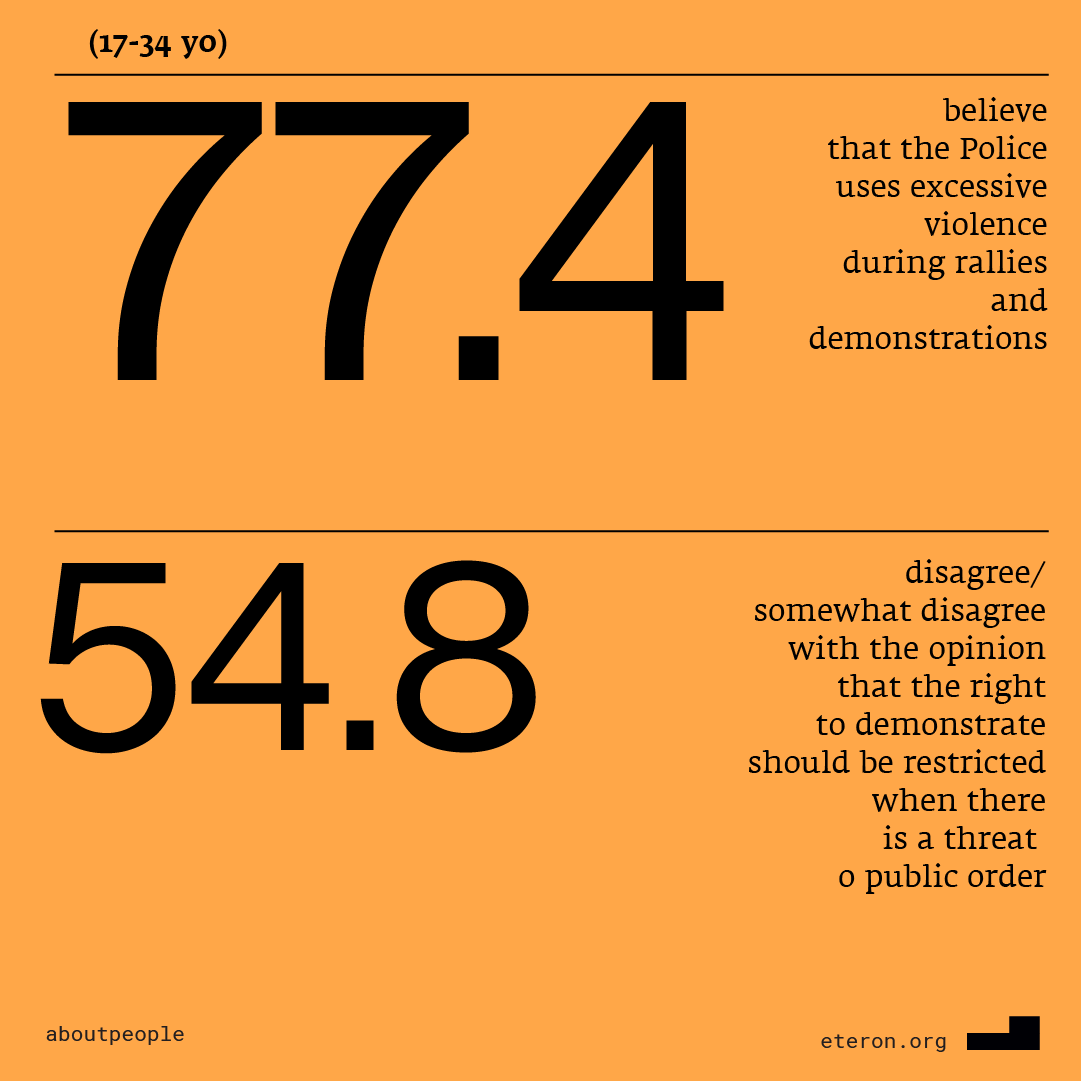
Graph 4
Moreover, 1 in 2 people replied that they have participated in a protest in the past and 1 in 4 said they have previously participated in a strike. In terms of the right to strike, a noteworthy finding from Eteron’s 2022 economic research, was that 82.3% of 17-24 year olds and 77.1% of 25-34 year olds agree/ somewhat agree with the position that the right to strike is sacred.
Moreover, in last year’s Eteron research on Generation Z, 1 in 4 young people responded that they had participated in a demonstration during 2021, which is impressive, especially considering the extended lockdown and the restrictions that Law 4703/2020 unsuccessfully imposed on the right of assembly.
In conclusion, the findings support the hypothesis that for a significant part of the younger generation, the demand for democratic deepening is linked to the participation in collective actions and social movements.
The economy, expenditures & the role of the State
In last year’s Eteron economic research, Gerasimos Moschonas highlighted in his analysis, that the pandemic led to the reinforcement of “state-oriented economic ideas at the expense of directions and values originating from the paradigm of economic liberalism”. This could also be a central conclusion drawn from the data we present today on the new generation, as clearly reflected in the findings summarised in Graph 5.
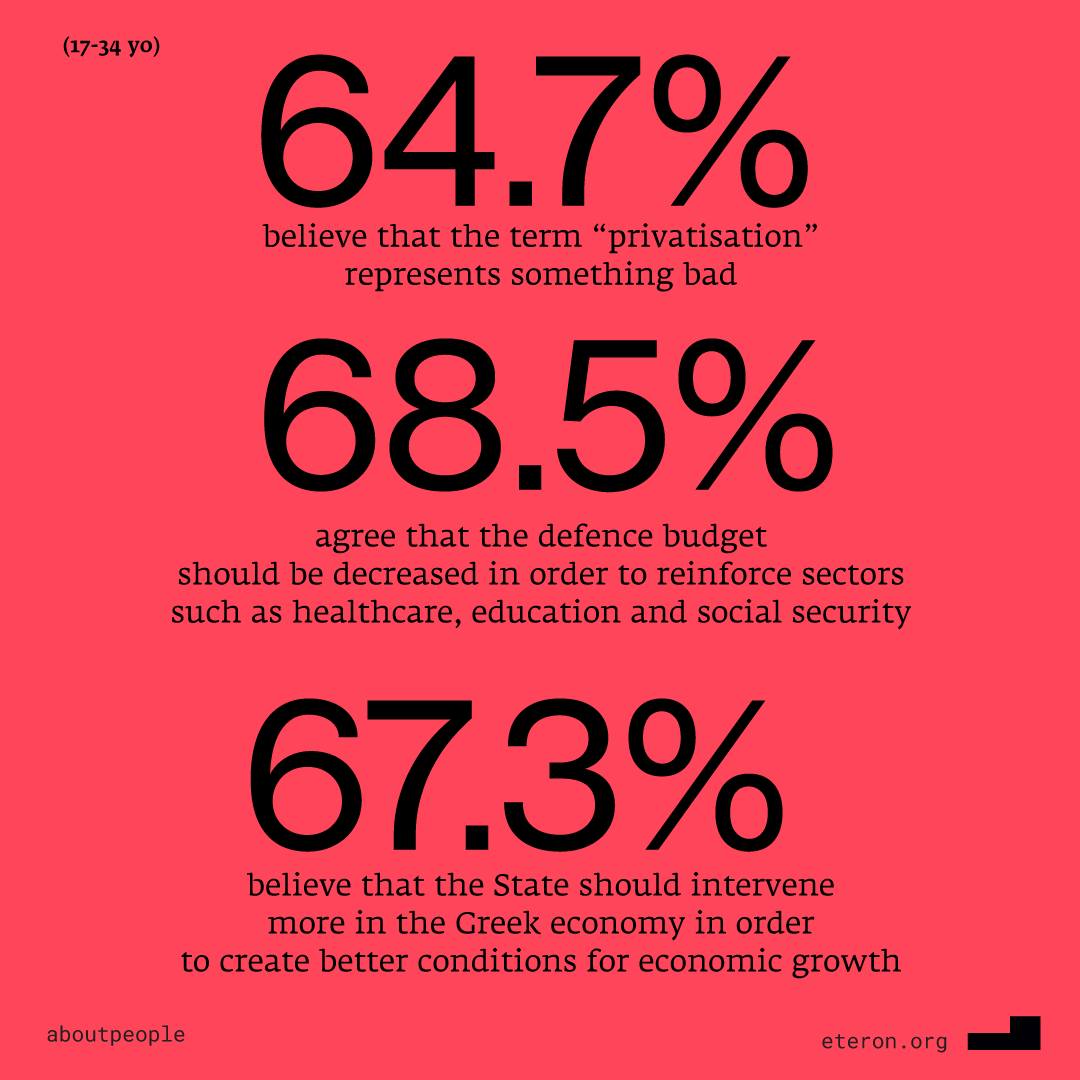
Graph 5
It is telling that only 20.7% believe that private businesses are the best possible means of creating better conditions for economic growth. In the same vein, the welfare state (80%) is very popular with the participants, while the Memorandums are extremely unpopular (84.6%).
It is striking that the percentage of young people who advocate for an “increase in defence spending in order to better protect national integrity” barely reaches 19.8%. Besides the strong message of redirecting public spending in areas such as healthcare, education and social security, this finding is significant for one more reason. Greece is the world leader in defence spending, surpassing even the US last year, as Greece spent 3.54% of its GDP on defence, while the US spent 3.46%.
When shifting back to the average rates for all age groups, we can observe the following: 57.1% think that the term “privatisation” represents something bad, 62.7% agree that defence spending should be decreased and 64.5% think that the State should intervene more in the economy in order to create better conditions for economic growth. There are some differences compared to the relevant percentages amongst 17-34 year olds, but these do not alter the main picture. On the contrary, they are a serious indication that the trend of state-oriented economic ideas, highlighted by Gerasimos Moschonas, is even stronger amongst the younger generation.
Similar findings emerge from the research “The Young Generation after the Tempi Train Disaster”, with the most indicative question being “what do you think needs to change in order for rail transport to be safe?”. The responses reflect young people’s disapproval of railway privatisation, with the majority being in favour of the re-nationalisation of all passenger services.
On the other hand, it would be wrong to underestimate the visible and invisible effects of neoliberalism. In Eteron’s 2022 economic survey, the responses to the following question are telling: When asked “Which of the following social groups is the one that mainly produces wealth in the economy? Is it mainly business owners or the workers?”, 46% of young people between the ages of 17 and 24 and 36.8% of those between 25-34 answered that “wealth is produced mainly by business owners”.
Finally, it is important to highlight a confusion that is reflected in some of the young people’s replies. For example, 60.2% consider that capitalism as a notion represents something negative. At the same time, 52.1% consider the market economy (a metonym for capitalism) to be a good thing. Similarly, 55.1% consider multinationals to be a bad thing but 58.9% regard foreign investment as something positive. This is a phenomenon observed in all age groups and which Y. Albanis, in an article in Efsyn, described as ideological comparativism.
In conclusion, we would say that the description given by Moschonas and Ioannidis in their analysis of the minds of voters, of a “mixed economic culture with prevalent left-wing ideas”, is also true for the young generation.
Migration
So far, it seems that there are certain stances and attitudes that are starting to crystallise amongst the younger generation as well as tendencies that are gaining ground on matters regarding democracy, economics and distrust towards the institutions. On the other hand, the new generation is not homogeneous in its views and practices and there are variations on the way young people stand towards several topics. One such topic is migration.
Let’s start from the “The Young Generation after the Tempi Train Disaster” research findings, and more specifically the question “What is/are the biggest problem(s) that Greece is facing at the moment? (up to 2 answers)”. As the research supervisor Loukia Kotronaki points out, one can detect a certain leaning towards cultural progressivism in the participants’ responses: “Here, the predominant issues of the conservative agenda, such as ‘Immigration/Refugees’ and ‘Greek-Turkish relations’ did not rank highly. They received only 11.5% and 5.9% of responses, compared to ‘Expensiveness/Cost of living’ and ‘Corruption’ for which the percentages were significantly higher, (69.4% and 58.3% respectively)”.
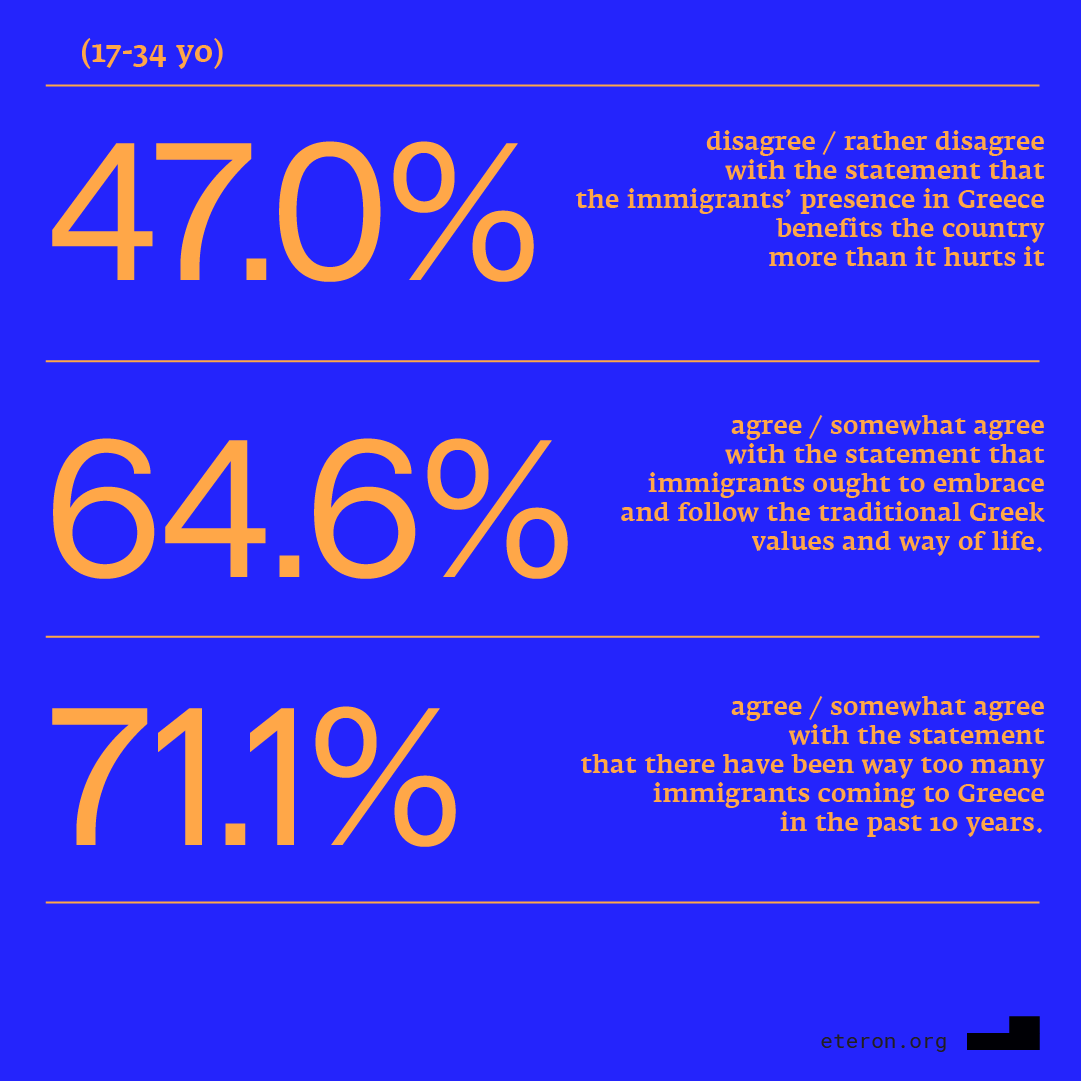
Graph 6
On the other hand, Graph 6 shows the deeper influence of the conservative agenda on the younger generation. The majority (47%) believes that the immigrants’ presence in Greece does more harm than good, while the percentages of those who agree or somewhat agree that the immigration levels in our country in the past 10 years have been too high and that immigrants should embrace Greek values and the Greek way of life are very high (71.1% and 64.6% respectively).
At this point, it is interesting to point out the significant generational differences as derived from the responses of the rest of the age groups. 58.7% of the 35-54 age group and 54.3% of the 55+ age group believe that the presence of immigrants in our country does more harm than good. Evenmore participants agree or somewhat agree that there have been too many immigrants coming to Greece in the past 10 years (77.7% of 35-54 year olds and 79.4% of 55+) and that immigrants should embrace Greek values and the Greek way of life (79.7% of 35-54 year olds and 89.4% of 55+).
The findings of Eteron’s economic research last year were quite similar, since 42% of 17-24 year olds and 50.8% of the young people between the ages of 25 and 34, agree or somewhat agree with the statement “Enough with immigrants! Greece cannot accept any more foreigners”. Here too, the differences between age groups stand out, as in all the other groups, the percentages of agreement with this xenophobic position range between 66.9% and 69.2%.
In conclusion, as far as the migration issues are concerned, one could say that although the effects of the conservative agenda on the younger generation are evident, at the same time xenophobia seems to have less impact on them than on the older generations, thus providing grounds for a possible and conditional change of attitude in the future.
LGBTQI+ rights & the MeToo movement
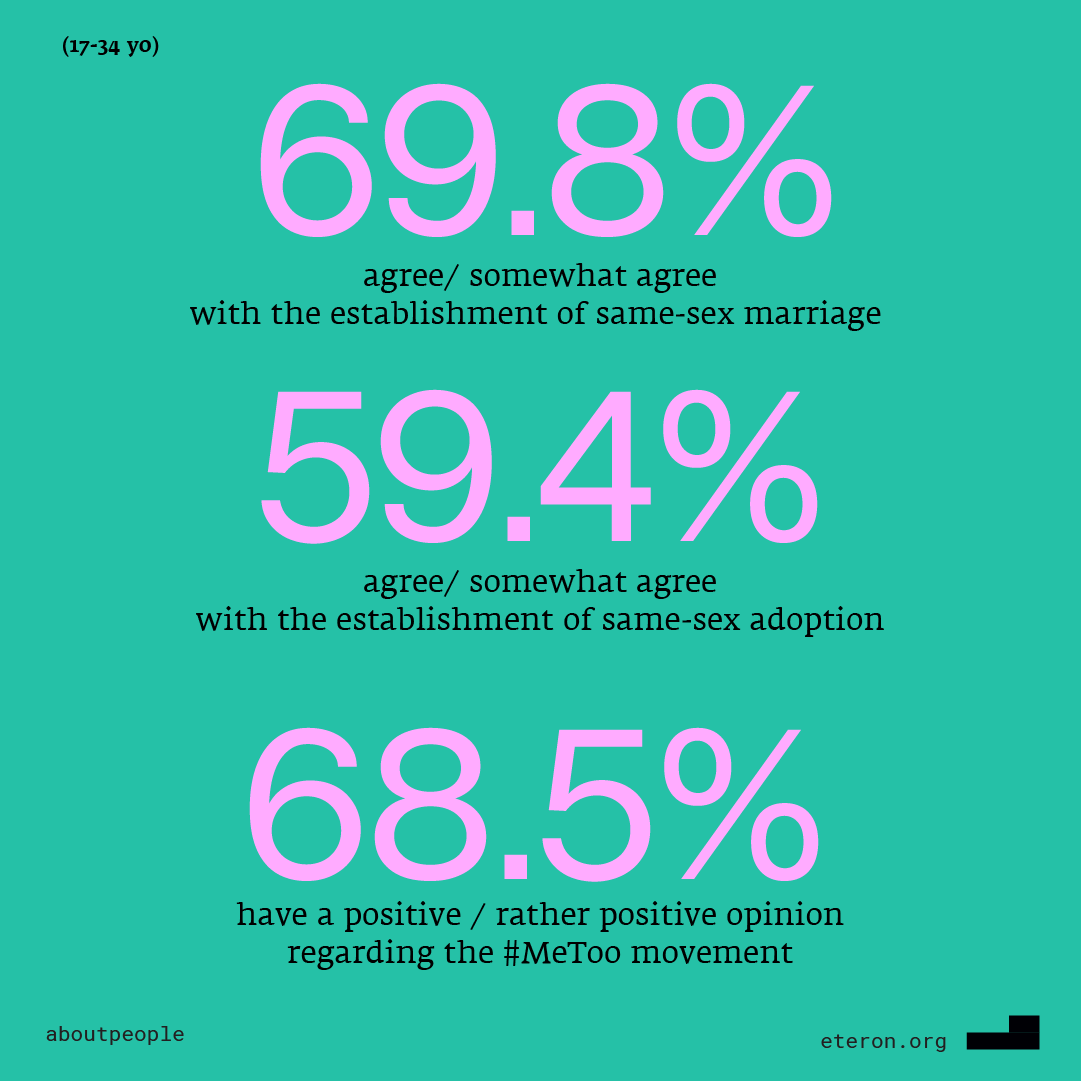
Graph 7
The topic where there seems to be a very clear mentality shift in the new generation is LGBTQI+ rights. The difference in the responses given by the different age groups is striking:
- 69.8% of young people agree/ somewhat agree with the establishment of same-sex marriage. The relevant percentage drops down to 55.1% for the 35 – 54 age group and to 46.2% for those over the age of 55.
- 59.4% agree/ somewhat agree with the establishment of same-sex adoption. In this case, the corresponding rate drops even more so, to 39.2% in the 35-54 age group and 29.1% in the 55+ age group.
A similar question on same-sex couples adopting children was included in Eteron’s broad-scale economic research last year. The gradual decline in the percentage of those who agree with that practice as the age of the participants gets older is rather telling. 70.4% of 17-24 year olds and 56.1% of 25-34 year olds agree & somewhat agree that same-sex couples should be allowed to adopt children. The percentage drops to 48.9% for ages 35 – 44, 37.5% for ages 44 – 55, 33.9% for ages 55 – 64, and then rises again to 37% for ages 65 and older.
Finally, 68.5% have a positive & somewhat positive opinion regarding the #MeToo movement. Although the younger generation appears to support the movement more than the other age groups, generational differences are not that pronounced on this particular subject. More specifically, 67.3% of those aged 35-54 have a positive & somewhat positive opinion regarding the #MeToo movement while 62% of those aged 55 and over share this view.
The high acceptance of the MeToo movement by the younger generation is also evident from Eteron’s previous research on Generation Z during the pandemic, where the percentage of young people who said they supported the reasoning and goals of the #MeToo movement reached 86.9%.
Ideological references & expectations for the future
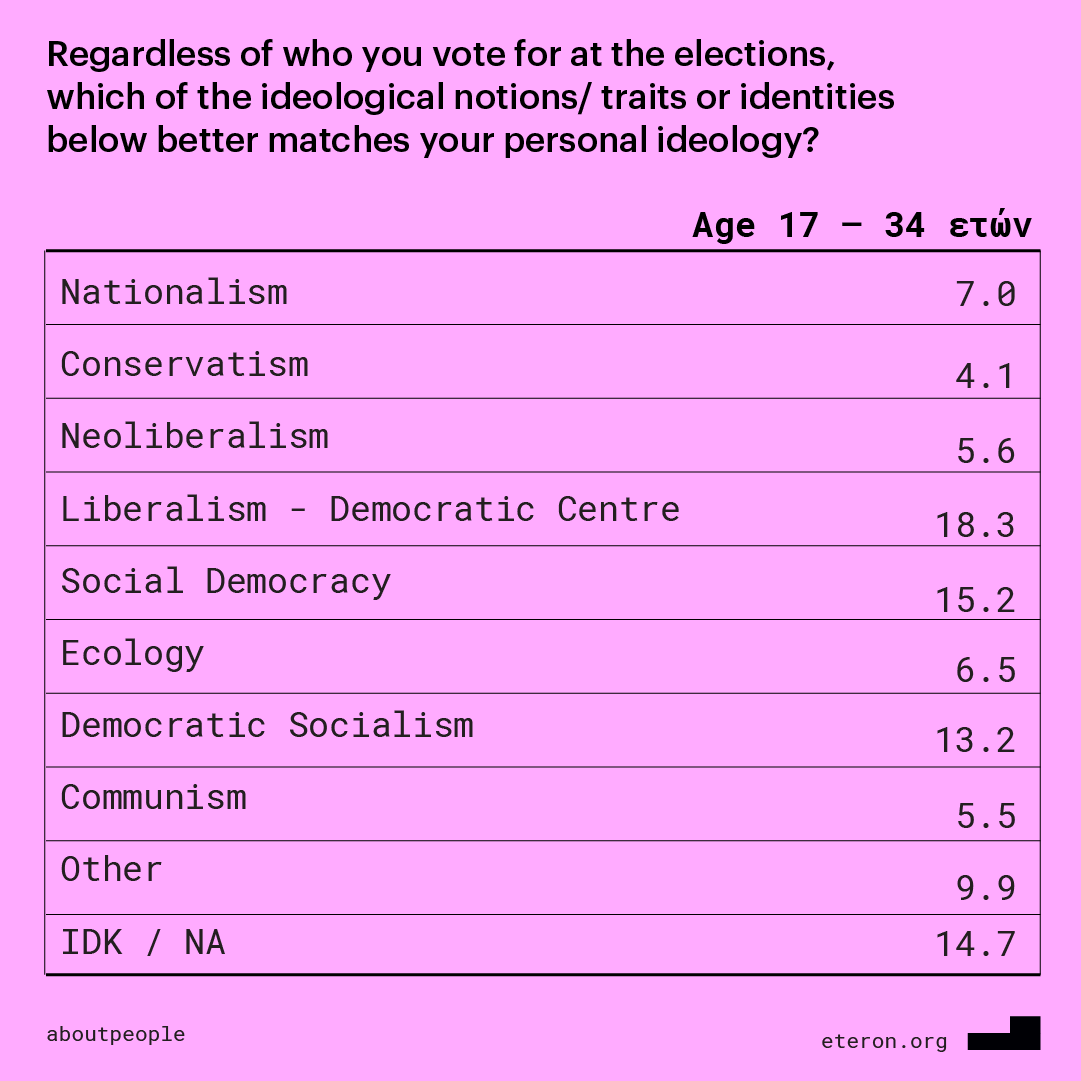
Graph 8
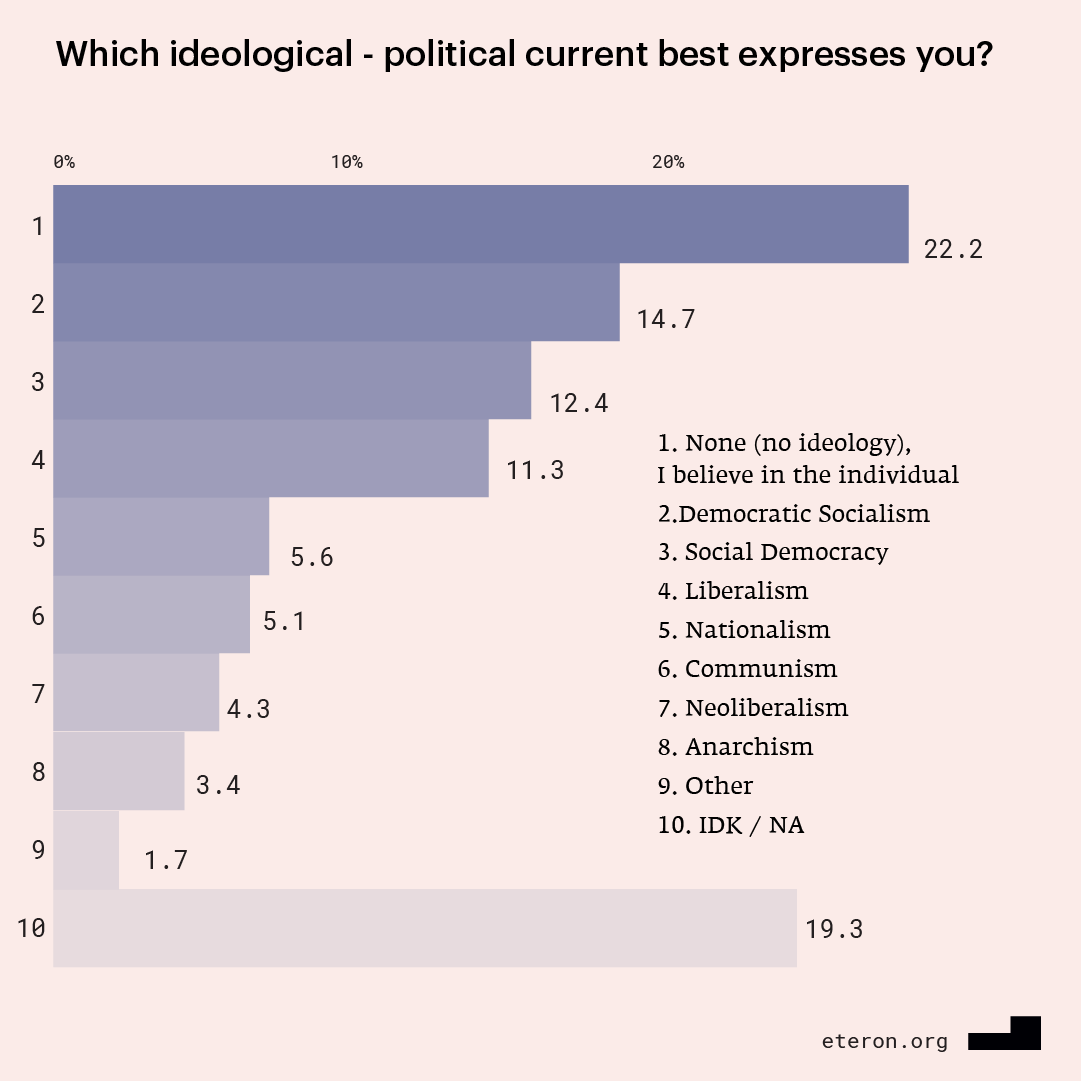
Graph 9
In terms of their overall ideological positioning, the leading response among young people is liberalism – democratic centre (18.3%), followed by social democracy (15.2%) and democratic socialism (13.2%). The average rates for the total sample (all age groups) are similar, although with slight differences: liberalism – democratic centre is at 19.7%, social democracy at 18.2% and democratic socialism at 16%. At the same time, the distinction between the Left and the Right remains important for 41% of young people compared to 53% who believe that this distinction is no longer relevant.
If we compare Graph 8 with Graph 9, which depicts the ideological – political currents, as recorded in the research “The Young Generation after the Tempi Train Disaster”, a number of interesting coincidences and divergences emerge, as well as questions that require further investigation:
- The addition of the option “None (no ideology) – I believe in the individual” stands out in Graph 9, and is the most popular one amongst young participants (22.2%). At a time when neoliberalism registers low percentages in both researches (5.6% and 4.3% respectively), its visible and invisible effects seem to remain significant. The link between neoliberalism and the “None (no ideology) – I believe in the individual” option demands further investigation.
- While liberalism in Graph 9 is at 11.3%, liberalism – democratic centre in Graph 8 occupies the lead (18.3%). The influence of the “democratic centre” designation requires further investigation.
- It is also quite interesting to study the ideological-political reference to “democratic socialism”, which in Graph 8 comes in third place with 13.2% and in Graph 9 is in second place with 14.7%. From the resulting correlations that emerge at a general sample level (ages 17 and over) and according to political party preference, we can see that “democratic socialism” is the most popular response amongst SYRIZA (40.4%) and MeRA25 (35.2%) voters and the second most popular one amongst those of the Greek Communist Party KKE (22.5%) and PASOK/KINAL (14.4%). It would be interesting to further investigate how voters perceive the term as well as the meanings they attribute to it.
- In both graphs the percentage of participants who picked “I don’t know / NA” is remarkable (14.7% and 19.3% respectively). In Graph 8 there is an equally uncharted 9.9% who responded “Other”.
To conclude our analysis, we shall take a look at young people’s expectations for the future. The majority are dissatisfied with their personal financial situation (55.7%). However, when it comes to their expectations, 1 in 3 people expect & somewhat expect that their finances will improve in the next 12 months. This finding is striking, as is the difference in the responses of young people compared to other age groups. While 33.9% of young people expect & somewhat expect that their personal finances will improve in the next year, the relevant percentage drops to 15.4% amongst 35-54 year olds and 14.8% amongst those aged 55 and over.
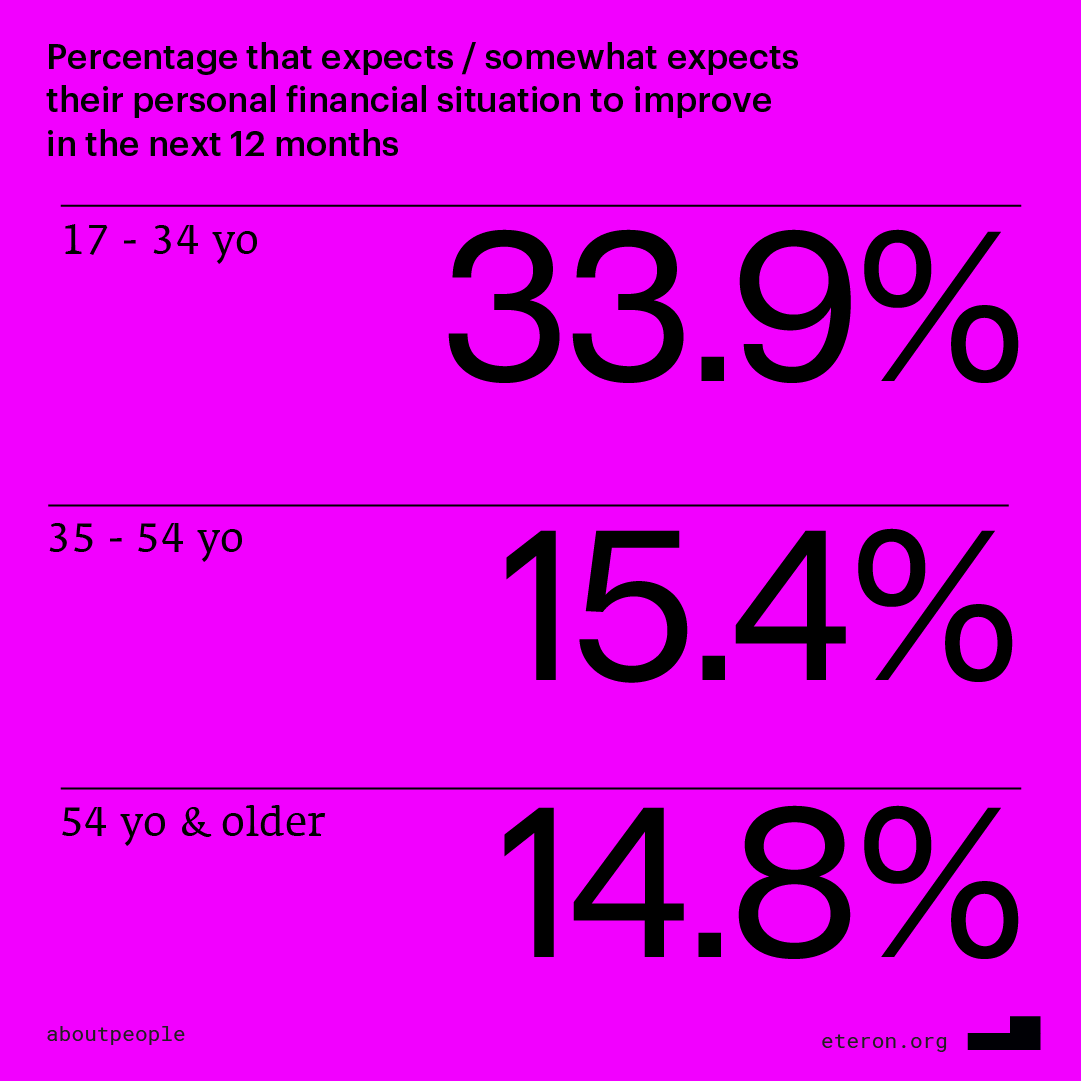
Graph 10
The comparative analysis gives us a more comprehensive view, as the research “The Young Generation after the Tempi Train Disaster” includes the question “how could you improve your life?”, where the leading answer is “by personally making individual efforts” (66.2%), followed by “by voting – governmental change” (35.5%) and the third was “by participating in collective actions and social movements” (33.2%), while 8.8% said that nothing could be done to improve their lives.
Again, the cross-associations enrich our perspective, as it turns out that more than 1/3 of those who advocate for making individual efforts in order to improve their lives, also participated in the protests after the Tempi disaster. Let’s think about this the other way around: although they participated in the protests, they have not come – or at least not yet – to the conclusion that collective action is a means to improve one’s life.
Conclusions
The citizens’ crisis of trust towards the institutions is deepening after the Tempi accident, and the rates of distrust towards all the institutions of the political system are a lot higher amongst the young generation. Young people are dissatisfied with the way democracy functions in Greece. A small anti-democratic nucleus is emerging, which can be linked to the influence the far-right has on the young generation.
However, the vast majority of young people associate dissatisfaction with a demand for democratic deepening through participation in public assemblies and referendums. Overall, the young generation participates in collective actions and social movements, prioritises the right to protest and takes a stand against police brutality.
As in other age groups, a mixed economic culture with a predominance of left-leaning ideas emerges when it comes to economic issues. In this respect, what stands out among the research findings is the strong call for a redirection of public spending in sectors such as healthcare, education and social security, and young people’s support for increased State intervention in the economy.
The young generation is not homogeneous in its views and practices and there are variations on the way young people stand towards several topics. For example, the impact of the conservative agenda on topics such as immigration is visible in younger people. At the same time, xenophobia has less profound influence on the young compared to older generations, thus establishing space for a possible future and conditional change in attitudes.
The area with the clearest evidence of a progressive shift in the mindset of the new generation is LGBTQI+ rights.
Young people’s interest in politics alongside their expectations that the situation will improve in the coming months leaves all options open for future developments. Finally, with regard to ideological-political currents, as mentioned in a previous analysis, there is an ongoing struggle within the young generation between, on the one hand, the key role of collective action, empathy, solidarity and a new left-leaning politicisation and, on the other hand, the significant impact of individualism and other key pillars of the dominant ideology.
Some ideas for further study and analysis could be to dig deeper into the age differences within each generation (e.g. between 17-24 year olds and 25-34 year olds) or to outline more coherently the political profiles of each age group before moving on to comparisons. Similarly, as an idea for further research, one could examine the generational differences within each electorate by looking at the results by party preference combined with an analysis by age group.
In any case, focusing on what we have already touched upon in the context of this analysis, the combination of quantitative research with qualitative research methodologies (focus groups, interviews, etc.) opens up new perspectives in our understanding of the issues in question. Eteron’s quantitative researches, which we attempted to review in a comparative perspective in the context of this analysis, open up multiple avenues of interdisciplinary investigations by building bridges between comparative political analysis, youth studies and the study of collective action and social movements.
Read also:

